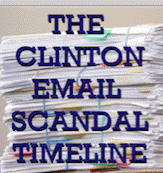Hidden in Plain Sight - Part 1
My guest today is Paul Thompson, researcher and author of The Clinton Email Scandal Timeline, an exhaustive chronology of events related to Hillary's email situation, which can be found online.
JB: Welcome to OpEdNews, Paul. Why did you decide to investigate this story in such depth?
PT: Like a lot of people, when I first heard of Clinton's emails in the news, I didn't pay close attention. I had heard about the Benghazi scandal, which seemed like a Republican witch-hunt to me (and largely still does), so I figured this was more of the same. It was only a few months ago that I heard some details that made me sit up and take notice. For instance, finding out that some of her emails were deemed top secret or even above top secret, I began taking a closer look, and the more I looked, the more I felt this was a very real and serious scandal. But I couldn't find any single resource online that put it all together. Even the Wikipedia page was sorely lacking (and still is). So I decided I'd have to make it myself.
JB: I think a lot of us have sort of coasted through the email scandal, assuming it was no big deal. Based on what you have ultimately come up with, putting this together must have been a daunting task. Did you have any idea when you got started what was going to be involved in doing this right?
PT: It has been a daunting task, because I feel time pressure. The timing of what information gets known when is vital, as we'll probably discuss later. I've worked hard to put this together in only a month and a half. But aside from that, yes, I knew what I was getting into because I did this all before. I put together timelines about terrorism during the George W. Bush era that were even more extensive (and were very critical of the Bush administration, by the way). Some of them were compiled into my book "The Terror Timeline," published by HarperCollins in 2004. So I had worked out a good system for boiling information down into a timeline format doing that, and it was just a matter of using that technique on a new topic.
JB: Lucky thing actually; you didn't have to waste time reinventing the wheel. We'll circle around to talk more about your system and format later. Readers will want to know: what's your relationship with Hillary's candidacy?
PT: If you would have asked me a year ago who I would vote for, I hadn't made my mind up yet. I easily could have voted for Hillary. But, after reading in depth about her email scandal and what the Clinton Foundation has done, and then coming to the conclusion that she had to be guilty of multiple serious crimes, how could I possibly support her? Naturally, I became a vocal supporter of Sanders. If you knew that someone living on your street was a criminal, wouldn't you feel compelled to warn your neighbors? That's why I've put so much time and effort into the timeline.
JB: That makes sense. I understand that there are numerous issues that could land Clinton in hot water. Share some with us, please.
PT: This scandal has many different facets to it. I believe political pundits have consistently underestimated the trouble Clinton is in because they've been focusing mainly on the content of her emails. That's just one aspect, but let's look at it now.
The key thing to keep in mind is that we, the public, only get to see the unredacted portions of her emails. Out of the 30,000 work-related Clinton emails released to the public, over 2,000 of them have been redacted to some degree. Many of them are entirely redacted, including 22 top secret or even above top secret emails. It's the redacted material that's likely to give Clinton the most trouble. For instance, The New York Times recently reported that 18 emails make reference to CIA assets or operatives. Remember the Valerie Plame scandal? This actually could be worse than that. And even that Times report doesn't include what's in those top secret emails, which could give her the most trouble of all.
JB: I'm not following. No one, at least no civilian, knows what's in those redacted emails, whatever their classification. So, unless there's a prosecution or charges brought, we have no way of evaluating how serious the breaches were.
PT: Exactly. There have been some hints in some news reports. And some Congresspeople have the clearances to see the redacted portions, so they've given some hints too. But if they say too much, they'll be in legal trouble as well. If Clinton is ever put on trial, it's likely that portions of the trial would have to be held behind closed doors, since that top secret material especially is likely to stay top secret and not leaked to the press. This is a big reason why it's so hard to know how likely the FBI is to recommend Clinton's indictment, because they know a lot more than the general public does.
JB: Better but still not quite clear. This is what I want to know: Because of all the redactions, is the FBI more likely or less likely to recommend indictment? Aren't they still under the same pressure from Obama not to indict, regardless of the content? And does the president know what's in the redacted emails?
(Note: You can view every article as one long page if you sign up as an Advocate Member, or higher).







